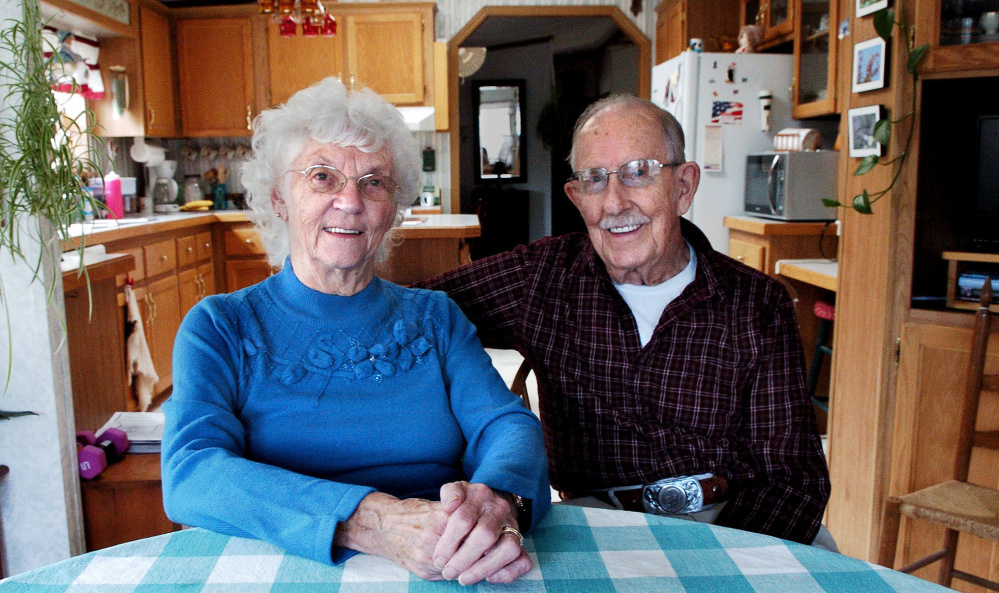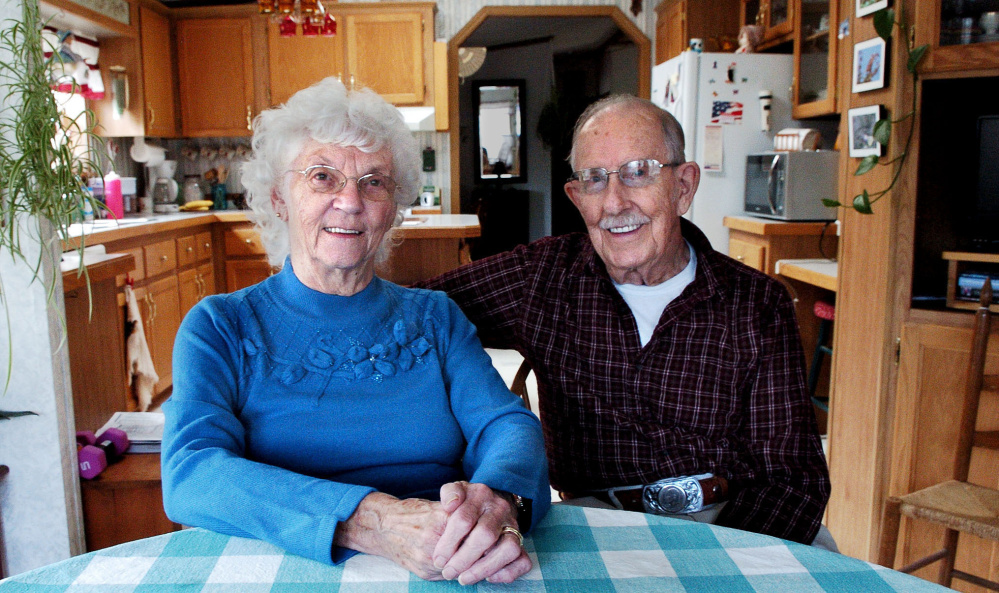Faced with the oldest population in the nation, central Maine towns are starting to look for ways to better serve their quickly aging residents.
In the town of China, residents voted at the Nov. 8 referendum to appropriate $3,800 from the undesignated fund balance to conduct a “community needs assessment,” which is a survey that will help the town conduct a “deeper dive” into its demographics, said town manager Dan L’Heureux, as well as assess the needs of its aging residents.
Soon, the China Board of Selectmen plans to put together a committee on the issue of “aging in place,” the concept that people should be able to age in a healthy and engaging way in the community they choose.
Other towns in central Maine are beginning to look at the issue too.
Seniors can face a number of hurdles involving aspects of life like health care, social engagement and transportation, said Gerard Queally, CEO and president of Spectrum Generations, a nonprofit that provides at-home and community based services to older and disabled adults.
Queally said there’s “no one recipe” – every town is different, and every town’s senior citizens have different needs.
The state has a median age of 43.5 years, giving it the No. 1 nationwide ranking, according to a 2012 estimate by the U.S. Census Bureau. The national average is 37.4 years.
Every town should look at its livability as its demographics shift, Queally said. According to AARP, 2,000 people in Maine turn 65 every month.
Queally said towns that don’t adjust to this shift will be “left behind.”
“If it’s not a good community to have an older population, it may not be a good community for a younger demographic,” he said.
While China’s tax increment financing committee has discussed the possibility of developing part of South China as a senior living community, Vassalboro is focusing on transportation.
Vassalboro has its own committee on aging that has been collecting surveys on senior issues and transportation needs. Town Manager Mary Sabins said she got the idea from a town manager training in the spring that discussed seniors.
Transportation appeared as a large need, which is what prompted a meeting between the town, Winslow, China and the Kennebec Valley Community Action Program, which provides busing services. But Sabins said she doesn’t expect “that will be the end of it.” Other issues noted in the surveys were energy efficiencies and access to a list of trusted local contractors.
Skowhegan, which typically gives more than $7,000 to Spectrum Generations, is also looking toward doing projects to help seniors. Town Manager Christine Almand said “a large majority” of the town’s population are seniors, so they are applying for grants to do a survey to get feedback on “what would make it easier for seniors to stay in their homes.”
FACED WITH CHOICES
Doris and Norman Blomquist knew each other in high school in Oakland, but didn’t meet again until a class reunion in 2000. In 2004, they got married.
Doris, 84, had moved to Massachusetts after school, where she raised a family for 40 years. She moved back to her hometown after retiring to be near her sisters and take care of her brother, who was sick at the time.
Norman, also 84, was in the Navy for 20 years after high school and served in Korea and Vietnam. He was in North Carolina for 14 years before coming back to Oakland for Doris.
Neither has significant health issues and both can still drive, so they don’t have many complaints overall. But there are a few things that are more difficult as a senior.
Getting access to information and finding out about helpful programs or services can be hard, they said.
“Information on medication or things that help elders isn’t disseminated very well,” Norman said.
One of the toughest hurdles is budgeting.
A flat income paired with rising costs across the board – health care, utility, rent – means some elderly people are forced to make choices on expenses they might have taken for granted their whole lives.
“I’ve considered getting rid of the TV more than once,” Doris said. The couple owns their home, but along with that comes constant upkeep, Norman said, and the price of electricity keeps increasing.
“It cuts out a lot of your activities,” Doris said, adding that she’d like to travel more if she had a bigger budget.
Some of their friends go to Florida in the winter, where they’ve found things to be less expensive, so they end up saving money.
Doris also has to make choices when it comes to her health. Norman has health care from the military system, which he finds to be better than Medicare. Since they’re married, Doris can order her medication through his health care provider and receive it in the mail at no cost to her. But, if her doctor wants her to start something immediately, she has to choose whether to get it through the mail for free or go pick it up that day and pay for it.
“That’s a choice I have to make,” she said.
Doris also knows other people with ongoing care costs, like diabetes medicine, that result in hundreds of dollars of monthly deductibles. But if she wanted to join Blue Cross for additional coverage to prevent those future costs, it would be an extra $300 per month, she said.
INCREASED NEED
Queally, of Spectrum Generations, said it can’t just be on the towns to improve their communities for the elderly. There has to be a partnership between towns, community services like Spectrum Generations, and residents.
A number of towns provide funding for the nonprofit, but whether or not they pay, residents of all towns have access to their services, Queally said.
The goal is to develop a livable community, which can benefit everyone, he said. Installing streetlights or paving better sidewalks with wheelchair access would help the elderly, but they could also help other demographics like children or parents pushing strollers.
Spectrum Generations helps some communities, like Waterville, with its five community centers in central and midcoast Maine that serve seniors statewide, four of which provide adult day care centers for adults who can’t fully care for themselves.
The organization is most in need of volunteers and donations to sustain its many projects, Queally said. While about 800 people volunteer each year, only about 300 of those people volunteer repetitively, and those numbers are decreasing as people stay in the workforce longer, he said.
At the same time, their programs are expanding. Five years ago, Spectrum Generations provided 180,000 meals through its Meals on Wheels program, Queally said. Now, it’s up to 233,000 meals per year.
Joann Austin, a selectwoman in China who also practices elder law at the Austin Law Office, said she thinks programs like Meals on Wheels are critical for seniors.
“I love the idea of having somebody that would regularly check on an elderly person in their home,” Austin said.
No one has ever told her they want to go a nursing home, she said, but, statistically, one-third of people will. Austin wants to look at ways to help that problem and keep people at home more often through volunteer programs.
“All of this requires that there be a growth of some sort of senior volunteer community awareness group, and so the town is starting to put that together,” she said.
While the aging committee has yet to officially form, Austin said there are some ideas floating around. One is to help seniors get transportation to Waterville through KVCAP, which provides busing services for some towns already. China officials met with the organization along with people from Winslow and Vassalboro to discuss potential options. The town also handed out surveys on election day to get feedback from townspeople, which she said was generally positive.
Austin would also like to create a community center or place for seniors to socialize, she said. Loneliness is one of the largest problems seniors face, she said, which is why she’d like the town to promote social events.
It’s also why she wants to promote programs like Meals on Wheels, or form a group of volunteers that would just check up on seniors who still live at home every few days.
“The attention of somebody who knows you over time is just invaluable,” Austin said.
Send questions/comments to the editors.




